 Natalie Portman’s recent performance in V for Vendetta has me thinking about bald women on the silver screen, particularly in science fiction movies.
Natalie Portman’s recent performance in V for Vendetta has me thinking about bald women on the silver screen, particularly in science fiction movies. Traditional films are quite conservative in the way they portray women’s hairstyles. As an indelible part of their sexuality, filmmakers have been reluctant to mess around with such an integral female attribute. Moreover, until fairly recently, female roles in action movies have been secondary to those of males. Men are supposed to be masculinized on screen and women feminized.
Obviously, in today’s supposed equal opportunity action film industry we now have our super-sexualized action hero females like Charlie’s Angels and Uma Thurman in Kill Bill. But let’s face it -- they’re still sex symbols, big hair and all.
It would seem, then, that the only way to de-sexualize a female hero is to have her shave her head. And in this sense, science fiction has led the way.
Sci-fi is a particularly powerful genre in that it can afford to be more experimental in its treatment of virtually any aspect that appears on screen. In science fiction, the weirder the better. And it only makes sense. When you’re trying to portray the future or otherworldliness, it helps to cross traditional boundaries.
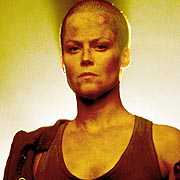 In sci-fi films, bald women have conveyed a number of things in addition to desexualization, including masculinity, sexual ambiguity, dehumanization, youthfulness, and innocence. And paradoxically, bald women have also been used to portray an enhanced sense of sexuality and control.
In sci-fi films, bald women have conveyed a number of things in addition to desexualization, including masculinity, sexual ambiguity, dehumanization, youthfulness, and innocence. And paradoxically, bald women have also been used to portray an enhanced sense of sexuality and control. Sigourney Weaver, for example, went bald in Aliens in a blatant show of female masculinity. Like Demi Moore in G.I. Jane, Weaver was better able to portray Ripley as a physical and tormented action hero without having to carry the baggage of female sexuality. Consequently, a strong case can be made that Ripley is one of the most believable female action characters yet realized in science fiction film. Another recent example of this, of course, is Natalie Portman’s portrayal of Evey Hammond in V for Vendetta.
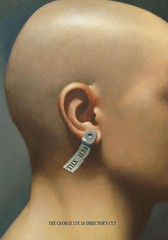 Along these lines, strong bald female characters tend to have an undeniable ‘butchy’ aspect to them. Put a bald actress on screen with a gun in her hand and suddenly you have a character whose sexual orientation is ambiguous at best.
Along these lines, strong bald female characters tend to have an undeniable ‘butchy’ aspect to them. Put a bald actress on screen with a gun in her hand and suddenly you have a character whose sexual orientation is ambiguous at best.Baldness can also represent something that has been taken away from us against our will, including our very humanity. In George Lucas’s THX 1138, for example, many of the main actors, including Maggie McOmie, were told to shave their heads in order to emphasize the dehumanizing nature of a future dystopian world.
Going back to 1927, the robot of Metropolis was sexually female, metallic, and bald. At least, that’s how we knew her to be on the inside; the robot is eventually given true human form and becomes an exotic dancer in the city's nightclubs, fomenting discord amongst the rich young men of Metropolis. But we, the viewer, know what bald malevolence lurks underneath.
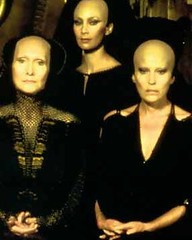 As shown in Metropolis, baldness can represent sexual control in a non-intuitive way. David Lynch’s version of Dune portrayed the women of the Bene Gesserit order with shaved heads, perhaps to convey their eerie power and strength (including their sexual prowess), and even possibly their aloofness towards the male gender.
As shown in Metropolis, baldness can represent sexual control in a non-intuitive way. David Lynch’s version of Dune portrayed the women of the Bene Gesserit order with shaved heads, perhaps to convey their eerie power and strength (including their sexual prowess), and even possibly their aloofness towards the male gender.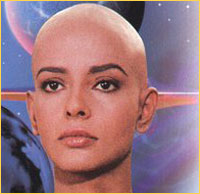 Similarly, in Star Trek: The Motion Picture, Persis Khambatta portrayed the Deltan Ilia, a bald species that can exude pheromones to arouse human males.
Similarly, in Star Trek: The Motion Picture, Persis Khambatta portrayed the Deltan Ilia, a bald species that can exude pheromones to arouse human males.With the Bene Gesserit and Ilia, these female characters are at once desexualized by their baldness, but by consequence have their very sexuality brought to the fore and accentuated – elements that are reinforced even further by their actions and overt sexuality. In a real sense, these women have become more sexually frightening and threatening by virtue of their shaved heads.
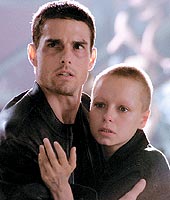 And finally, in Steven Spielberg’s version of Minority Report, Samantha Morton played a Precog that was able to predict certain future events. These characters had a certain purity and innocence about them – elements that were emphasized by portraying them without hair. As a result, Spielberg was able to give them a sort of youthfulness and naiveté.
And finally, in Steven Spielberg’s version of Minority Report, Samantha Morton played a Precog that was able to predict certain future events. These characters had a certain purity and innocence about them – elements that were emphasized by portraying them without hair. As a result, Spielberg was able to give them a sort of youthfulness and naiveté. Truth, of course, can be stranger than fiction. Or rather, the future will be stranger than fiction. Given Donna Haraway’s call for female liberation through cyborg form, the desexualization of women may not just be an artistic device, but a true real world phenomenon.
For the time being, however, we’ll have to settle for Natalie Portman; but that's okay, because bald never looked so cute.
Tags: science fiction, baldness, bald women, feminism, gender issues.

7 comments:
http://static.flickr.com/51/106661102_50068cc949_m.jpg
Recent photo of me. :)
Thanks!
Im researching women in science-fiction films, and have recently been watching a variety of films. I have realised that many women are now shown with short hair and are portrayed as butch for example trinity in the matrix. my teacher however believes this is untrue and feels as tho i have made it up!
have you got any more films recent or old that portray women? as my research topic is 'how women are represented in science-fiction films
I too am studying the role of women in science fiction films and would extremeley grateful for any help
Concerning bald women, some can probably pull it off, and others look better if they kept their hair. I thought it would be up to the individual; in that case, I rather keep my hair. :)
That was pretty interesting.
Ripley shaved her head in Alien 3, not Aliens
Thanks for the interesting text. I suddenly stumbled upon this text, but by accident I had had a vivid discussion on female action heroes this morning. How does one make a heroine credible? Is making her unsexual or more manly the only way? I believe it should be possible to create a perfect credible heroine with hair. Hair is, as you pointed out, also a way to accent sexuality, so I think it's the (modern, un-traditional, maybe manly) attitude what makes a woman kick-ass. Beatrice in Kill Bill doesn't use her sexuality in the way Lara Croft does. Would shaving her give her the credibility she needs, you think?
Post a Comment